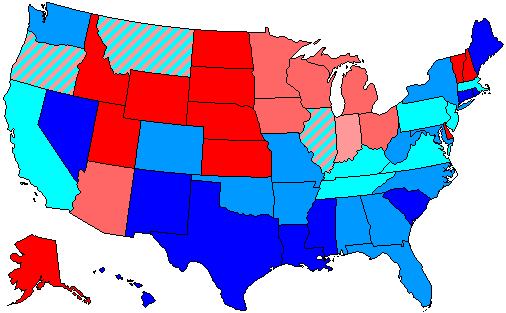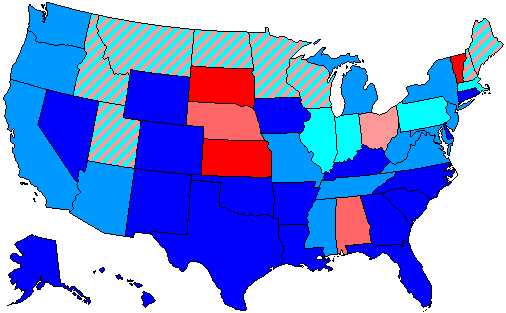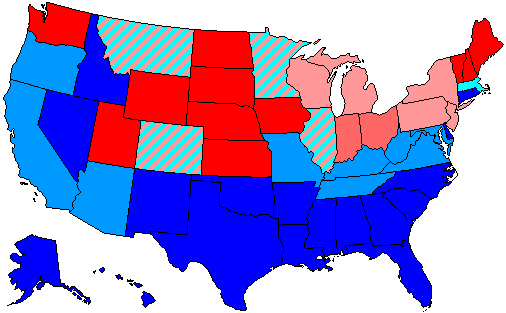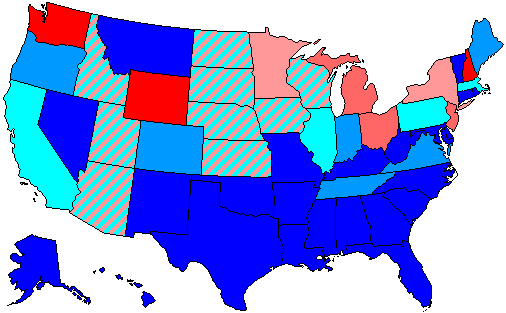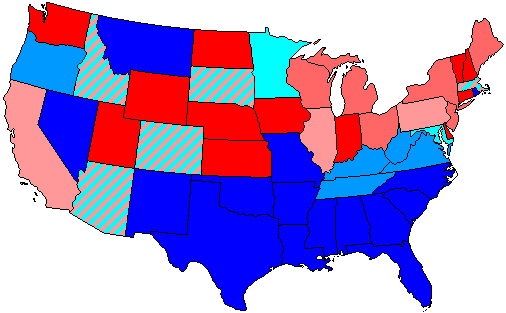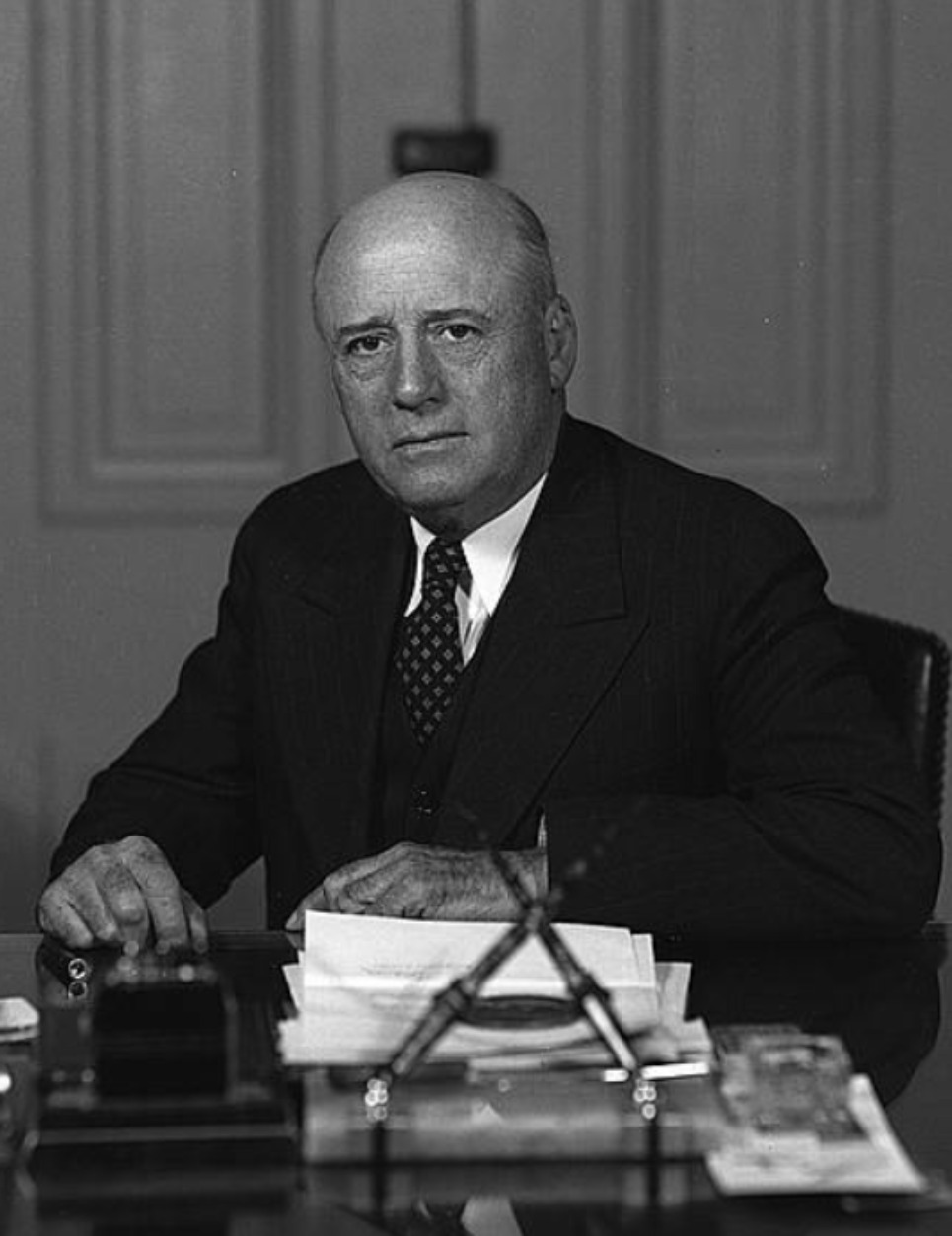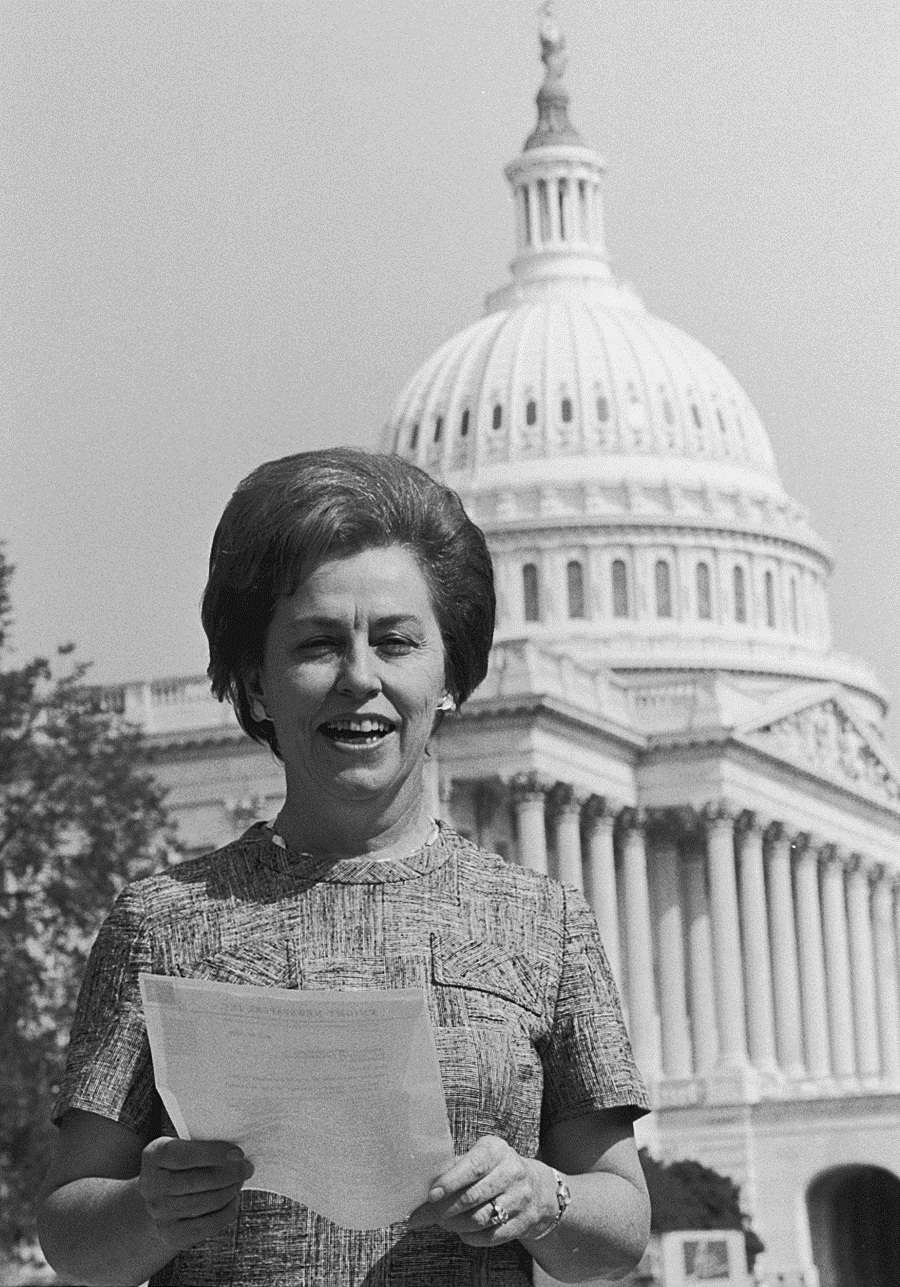|
Michigan's 17th Congressional District
Michigan's 17th congressional district is an obsolete United States congressional district in Michigan. The first Representative to Congress elected from the 17th district, George Anthony Dondero, took office in 1933, after reapportionment due to the 1930 census. The district was dissolved following the 1990 census. The last Representative elected from the district, Sander M. Levin Sander Martin Levin (born September 6, 1931) is an American politician who served in the United States House of Representatives from 1983 to 2019, representing (numbered as the from 1983 to 1993 and as the from 1993 to 2013). Levin, a member o ..., was subsequently elected from the 12th district. From 1982 until the districts demise it included all of Detroit west of the Southfield Freeway, Redford Township, Dearborn Heights, Southfield, Lathrup Village, Oak Park, Berkley, Royal Oak Township, Pleasant Ridge, Ferndale, Royal Oak, Huntington Woods and Clawson. List of representatives References ... [...More Info...] [...Related Items...] OR: [Wikipedia] [Google] [Baidu] |
United States
The United States of America (U.S.A. or USA), commonly known as the United States (U.S. or US) or America, is a country primarily located in North America. It consists of 50 states, a federal district, five major unincorporated territories, nine Minor Outlying Islands, and 326 Indian reservations. The United States is also in free association with three Pacific Island sovereign states: the Federated States of Micronesia, the Marshall Islands, and the Republic of Palau. It is the world's third-largest country by both land and total area. It shares land borders with Canada to its north and with Mexico to its south and has maritime borders with the Bahamas, Cuba, Russia, and other nations. With a population of over 333 million, it is the most populous country in the Americas and the third most populous in the world. The national capital of the United States is Washington, D.C. and its most populous city and principal financial center is New York City. Paleo-Americ ... [...More Info...] [...Related Items...] OR: [Wikipedia] [Google] [Baidu] |
1946 United States House Of Representatives Elections In Michigan
The 1946 United States House of Representatives elections took place 19 months after President Harry S. Truman assumed office upon the death of Franklin D. Roosevelt. Truman was vice president under President Franklin D. Roosevelt and was thrust into the presidency following Roosevelt's death. Truman did not garner the same support as the deceased president. Democrats had controlled Congress since 1931, for 16 years, and Roosevelt had been elected to a record four terms in office. The 1946 election resulted in Republicans picking up 55 seats to win majority control. Joseph Martin, Republican of Massachusetts, became Speaker of the House, exchanging places with Sam Rayburn, Democrat of Texas, who became the new Minority Leader. The Democratic defeat was the largest since they were trounced in the 1928 pro-Republican wave that brought Herbert Hoover to power. The vote was largely seen as a referendum on Truman, whose approval rating had sunk to 32 percent over the president's co ... [...More Info...] [...Related Items...] OR: [Wikipedia] [Google] [Baidu] |
1966 United States House Of Representatives Elections In Michigan
The 1966 United States House of Representatives elections was an election for the United States House of Representatives in 1966 which occurred in the middle of President of the United States, President Lyndon B. Johnson's second term. As the Vietnam War continued to escalate and race riots exploded in cities across the country, Johnson's popularity had fallen, and the opposition United States Republican Party, Republican Party was able to gain a net of 47 seats from Johnson's History of the Democratic Party (United States), Democratic Party, which nonetheless maintained a clear majority in the House. This was also the first election that occurred after the Voting Rights Act of 1965 became law. Republican gains * Alaska's at-large congressional district: four-term Democratic incumbent Ralph Julian Rivers was defeated by Republican State Senator Howard Wallace Pollock. * Arizona's 3rd congressional district: sophomore Democrat George F. Senner Jr. was defeated by state legislator ... [...More Info...] [...Related Items...] OR: [Wikipedia] [Google] [Baidu] |
1964 United States House Of Representatives Elections In Michigan
The 1964 United States House of Representatives elections was an election for the United States House of Representatives in 1964 which coincided with the election to a full term of President Lyndon B. Johnson. Johnson's landslide victory over Barry Goldwater allowed his Democratic Party to gain a net of 36 seats from the Republican Party, giving them a two-thirds majority in the House. The election also marked the first time since Reconstruction that Republicans made inroads in the deep South. Disappointment over the results caused House Republicans to replace Minority Leader Charles Halleck with future President Gerald R. Ford. Overall results Summary of the November 3, 1964, election results Southern significance While the GOP performed badly nationally, Goldwater's tremendous success in the Deep South led to the election of several Republicans to the House from those states, many of them the first Republicans elected there since Reconstruction. These "Goldwater ... [...More Info...] [...Related Items...] OR: [Wikipedia] [Google] [Baidu] |
1962 United States House Of Representatives Elections In Michigan
The 1962 United States House of Representatives elections was an election for the United States House of Representatives in 1962, which occurred in the middle of President of the United States, President John F. Kennedy's term. As in most midterm elections, Kennedy's United States Democratic Party, Democratic Party lost seats to the opposition United States Republican Party, Republican Party, but retained a majority. House Democrats were expected to lose their majority, but the resolution over the Cuban Missile Crisis just a few weeks prior led to a rebound in approval for the Democrats under President Kennedy. The number of seats up for election went back to 435, in accordance with reapportionment resulting from the 1960 census. The membership had been increased temporarily to 437 in 1959, providing 1 seat each for the new states of Alaska and Hawaii, while the other 435 seats continued with the reapportionment resulting from the 1950 census. This was the last midterm election cy ... [...More Info...] [...Related Items...] OR: [Wikipedia] [Google] [Baidu] |
1960 United States House Of Representatives Elections In Michigan
The 1960 United States House of Representatives elections was an election for the United States House of Representatives in 1960, which coincided with the election of President John F. Kennedy and was the first house election to feature all 50 current U.S. states. There were 437 seats, the most in U.S. history: 435 from the reapportionment in accordance with the 1950 census, and one seat for each of the new states of Alaska and Hawaii. Although Democrats retained control, it was the first time since 1908 that an incoming president's party lost seats in the House, which would not happen again until 1988. Overall results SourceElection Statistics - Office of the Clerk Special elections In these special elections, the winner was seated during 1960 or before January 3, 1961; ordered by election date, then state, then district. , - ! , Isidore Dollinger , , Democratic , 1948 , , Incumbent resigned December 31, 1959 to become District Attorney of Bronx County.Ne ... [...More Info...] [...Related Items...] OR: [Wikipedia] [Google] [Baidu] |
1958 United States House Of Representatives Elections In Michigan
The 1958 United States House of Representatives elections was an election for the United States House of Representatives in 1958 which occurred in the middle of Dwight Eisenhower's second term. The economy was suffering the Recession of 1958, which Democrats blamed on Eisenhower. The President's Republican Party lost 48 seats in this midterm election, increasing the Democratic Party's majority to a commanding level. Another factor which may have contributed to the Democratic gains include public consternation over the launch of Sputnik and Cold War politics. Disappointment with the results led House Republicans to replace Minority Leader Joseph W. Martin Jr. with his deputy, Charles Halleck. Overall results SourceElection Statistics - Office of the Clerk Special elections Alabama Alaska Arizona Arkansas California Colorado Connecticut Delaware Florida Georgia Idaho Illinois Ind ... [...More Info...] [...Related Items...] OR: [Wikipedia] [Google] [Baidu] |
1956 United States House Of Representatives Elections In Michigan
The 1956 United States House of Representatives elections was an election for the United States House of Representatives in 1956 which coincided with the re-election of President Dwight D. Eisenhower. With no major national issues and the economic upswing of the 1950s in full force, voters generally chose to uphold the status quo, keeping the Republican president and the Democratic Congress. Overall results Special elections In these special elections, the winner was seated during 1956 or before January 3, 1957; ordered by election date. Alabama Arizona Arkansas California Colorado Connecticut Delaware Florida Georgia Idaho Illinois Indiana Iowa Kansas Kentucky Louisiana Maine Maryland Massachusetts Michigan Minnesota Mississippi Missouri Montana Nebraska Nevada New Hampshire New Jersey New Mexico New York North Carolina North Dakota Ohi ... [...More Info...] [...Related Items...] OR: [Wikipedia] [Google] [Baidu] |
1954 United States House Of Representatives Elections In Michigan
The 1954 United States House of Representatives elections was an election for the United States House of Representatives in 1954 which occurred in the middle of President Dwight Eisenhower's first term. Eisenhower's Republican Party lost eighteen seats in the House, giving the Democratic Party a majority that it would retain in every House election until 1994. , this is the last time the House changed partisan control in two cycles in a row. Perhaps the major reason for the Republican defeat was the backlash against the Army-McCarthy Hearings, in which prominent Republican Senator Joe McCarthy accused countless political and intellectual figures of having Communist ties, usually with no evidence. Another issue was the Dixon-Yates contract to supply power to the Atomic Energy Commission. Sam Rayburn of Texas became Speaker of the House, exchanging places with new Minority Leader Joseph W. Martin Jr. of Massachusetts; they went back to what they had been before the 1952 elect ... [...More Info...] [...Related Items...] OR: [Wikipedia] [Google] [Baidu] |
Martha Griffiths
Martha Wright Griffiths (January 29, 1912 – April 22, 2003) was an American lawyer and judge before being elected to the United States House of Representatives in 1954. Griffiths was the first woman to serve on the House Committee on Ways and Means and the first woman elected to the United States Congress from Michigan as a member of the Democratic Party. She was "instrumental" in including the prohibition of sex discrimination under Title VII of the Civil Rights Act of 1964. In 1982, Griffiths was also the first woman elected Lieutenant Governor of Michigan, as Matilda Dodge Wilson had been appointed the first female Lieutenant Governor of Michigan in 1939. Life and career Martha Edna Wright was born in Pierce City, Missouri. She attended public schools and went on to graduate with a B.A. from the University of Missouri in 1934. She chose to continue her education by studying law and graduated from the University of Michigan Law School in 1940. She married Hicks George Gr ... [...More Info...] [...Related Items...] OR: [Wikipedia] [Google] [Baidu] |
Martha Wright Griffiths
Martha Wright Griffiths (January 29, 1912 – April 22, 2003) was an American lawyer and judge before being elected to the United States House of Representatives in 1954. Griffiths was the first woman to serve on the House Committee on Ways and Means and the first woman elected to the United States Congress from Michigan as a member of the Democratic Party. She was "instrumental" in including the prohibition of sex discrimination under Title VII of the Civil Rights Act of 1964. In 1982, Griffiths was also the first woman elected Lieutenant Governor of Michigan, as Matilda Dodge Wilson had been appointed the first female Lieutenant Governor of Michigan in 1939. Life and career Martha Edna Wright was born in Pierce City, Missouri. She attended public schools and went on to graduate with a B.A. from the University of Missouri in 1934. She chose to continue her education by studying law and graduated from the University of Michigan Law School in 1940. She married Hicks George Gri ... [...More Info...] [...Related Items...] OR: [Wikipedia] [Google] [Baidu] |
1952 United States House Of Representatives Elections In Michigan
The 1952 United States House of Representatives elections was an election for the United States House of Representatives in 1952 which coincided with the election of President of the United States, President Dwight Eisenhower. Eisenhower's United States Republican Party, Republican Party gained 22 seats from the United States Democratic Party, Democratic Party, gaining a majority of the House. However, the Democrats had almost 250,000 more votes (0.4%) thanks to overwhelming margins in the Solid South. It was also the last election when both major parties increased their share of the popular vote simultaneously, largely due to the disintegration of the American Labor Party and other third party (United States), third parties. Outgoing President Harry Truman's dismal approval rating was one reason why his party lost its House majority. Also, continued uneasiness about the Korean War was an important factor. Joseph W. Martin Jr., Joseph Martin (R-Massachusetts) became Speaker of the ... [...More Info...] [...Related Items...] OR: [Wikipedia] [Google] [Baidu] |
.jpg)
